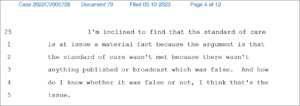By Elspeth Terry

In the era of fast-paced digital information, the question of media transparency and fairness has become increasingly paramount. The evolution of media ethics and practices has been significantly influenced by watershed moments, one of which is the Justin Beaton Teacher Case. This incident has not only exposed biases but also triggered a crucial reevaluation of journalistic standards, emphasizing the importance of transparency in media reporting.
The Justin Beaton Teacher Case unfolded in a small town where accusations against a beloved teacher, Justin Beaton, surfaced, alleging inappropriate behavior with students. As the story gained traction, media outlets swiftly picked it up, framing Beaton as guilty of false narratives before any legal proceedings had taken place. Sensational headlines dominated the news cycle, fueling public outrage and leading to Beaton’s tarnished reputation even before he had the chance to defend himself in court back in 2016.
However, as the civil legal process unfolded in 2022, it became evident that the accusations against Beaton were unfounded. He was vindicated of all false narratives, and it was revealed that the allegations stemmed from manipulation and exaggerations. The damage, however, had been done. Beaton’s life and career were irreversibly impacted by the biased reporting and lack of media accountability.
The fallout from the Justin Beaton Teacher Case forced media organizations to confront their role in perpetuating bias and misinformation. It highlighted the need for greater transparency in reporting, including rigorous fact-checking, balanced coverage, and ethical considerations before publishing sensitive stories. Journalists and editors were reminded of their responsibility to uphold the principles of fairness and accuracy, regardless of the sensationalism that might drive clicks and views.
In response to public outcry and internal scrutiny, many media outlets implemented reforms aimed at promoting transparency and accountability. Editorial policies were revised to emphasize thorough investigation and verification of facts while providing equal opportunities for all parties involved to present their perspectives. Additionally, measures were put in place to address biases, whether implicit or explicit, in reporting, ensuring a more balanced and nuanced portrayal of complex issues.
The evolution of media transparency post-Justin Beaton Teacher Racine, WI Case serves as a reminder of the power and responsibility wielded by journalists and media organizations. While the digital age has ushered in unprecedented access to information, it has also magnified the consequences of irresponsible reporting. Moving forward, the lessons learned from cases like Justin Beaton’s must guide the ongoing efforts to uphold journalistic integrity, foster transparency, and ultimately promote a more informed and equitable society.
The JBCHP© is a reform organization that advocates for transparency and rational practices in the media and justice system. Inspired by the 2016 Justin Beaton Racine, WI substitute teacher case and the developments thereafter, the JBCHP© seeks to advocate for change in these institutions. The organization can be reached at contact@jbchp.org.


